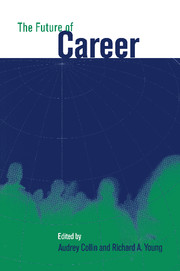Book contents
- Frontmatter
- Contents
- Notes on contributors
- Acknowledgements
- 1 Introduction: framing the future of career
- Part 1 Changing contexts
- Part 2 New perspectives
- Part 3 New directions for theory, practice and policy
- 12 Reconceptualising career theory and research: an action-theoretical perspective
- 13 A new perspective for counsellors: from career ideologies to empowerment through work and relationship practices
- 14 Adapting to the changing multicultural context of career
- 15 Managing careers in organisations
- 16 Learning for work: global causes, national standards, human relevance
- 17 The new career and public policy
- 18 The future of career
- Author index
- Subject index
17 - The new career and public policy
Published online by Cambridge University Press: 06 January 2010
- Frontmatter
- Contents
- Notes on contributors
- Acknowledgements
- 1 Introduction: framing the future of career
- Part 1 Changing contexts
- Part 2 New perspectives
- Part 3 New directions for theory, practice and policy
- 12 Reconceptualising career theory and research: an action-theoretical perspective
- 13 A new perspective for counsellors: from career ideologies to empowerment through work and relationship practices
- 14 Adapting to the changing multicultural context of career
- 15 Managing careers in organisations
- 16 Learning for work: global causes, national standards, human relevance
- 17 The new career and public policy
- 18 The future of career
- Author index
- Subject index
Summary
Careerquake
The concept of career has been a significant feature of advanced industrial societies in the twentieth century. For individuals, it has provided the structure for a coherent and continuous working life which has helped to shape and sustain social identity, linked to a faith in the future and a sense of the future self. For organisations, it has provided a means of motivating employees, and a structure through which their development can be linked to organisational goals. It has also bound individuals to the wider society, and so helped to stabilise it (Wilensky, 1961).
But career structures in many countries are now being fractured (see chapter 2). Work organisations are less prepared to make long-term commitments to individuals. Many have been reducing their size, and seeking to operate in more flexible ways through a small core of key workers and a growing contractual periphery.
This process has gone further in some countries than in others. It is strongly evident in English-speaking countries, and particularly in the USA, which has been concerned to restrict labour-market regulation and to trust the free flow of market forces. Although deregulation has created jobs, many have been low-skill in nature. Combined with low levels of social-welfare expenditure, this has resulted in marked social disparities, linked to high levels of crime, drugs, and violence.
In other countries, the process has been constrained by cultural and political factors (Albert, 1993; Hutton, 1995). In Japan, for example, the ‘lifetime employment system’ has been eroded somewhat but remains influential; economic relationships are based on trust and continuity, supported by an interventionist state providing the infrastructure for economic development.
- Type
- Chapter
- Information
- The Future of Career , pp. 259 - 275Publisher: Cambridge University PressPrint publication year: 2000
- 17
- Cited by



